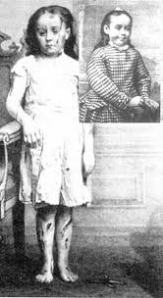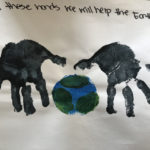A Reader’s Reflections on: Out of the Darkness
Katherine Hannula Hill joined the Supervised Visitation Program at SPCC in the winter of 2012, after relocating from Seattle. She is inspired in her work helping families reunite after lengthy separation, and loves to facilitate growth and repair in parent/child relationships involved in the child welfare system. Katherine lives in a small town outside of Rochester, NY.
Inspired to learn more about SPCC’s history, Katherine recently read Out of the Darkness: The Story of Mary Ellen Wilson by Eric A. Shelman & Stephen Lazoritz. SPCC was created as a direct result of Mary Ellen’s maltreatment, and she was the first child to be served by SPCC. Mary Ellen’s life, survival, and SPCC’s interventions mark the beginning of the child protection movement in the United States.
Coming by a job these days is no easy task, so when you manage to get one everyone asks about it. And when you live in a small town of 400 (including cats and dogs) that means everyone— even that person at the deli you’re pretty sure you’ve never met before. After three months of looking, I was happy to tell everyone when I finally found a job at SPCC. It quickly became apparent that telling that I got a job was the easy part. Explaining what the job was, and who it was with was more difficult. Conversations went something like this:
Them: “I heard you just got a job! Congratulations! Where do you work?”
Me: “SPCC!”
Them: “SP… what?”
Me: “The Society for the Protection and Care of Children.”
Them: “Oh…”
Me: “I work in the Supervised Visitation Program.”
Them: “Oh…”
This only happened once or twice before I came up with a spiel. I would cut them off at “SP—” and say: “The Society for the Protection and Care of Children. It’s a long name with a really cool story. It used to be called Society for the Prevention of Cruelty to Children, mirroring the American Society for the Prevention of Cruelty to Animals, or the ASPCA. In the 1870’s a little girl was being horribly abused by her parents, to the point where neighbors wanted to get involved to protect her. But get this—there was nowhere to bring a child being abused. At this time an agency had just been formed to protect animals and the neighbors brought her there, hoping they could help her. Isn’t it weird to think that our country had a place for animals to be protected before we had even considered creating a place for children to be protected?”
After six months of working at SPCC, this story comes in handy when I meet new people—it’s a quick, genuine and digestible beginning history of our agency. While I got comfortable telling it, I started to get curious about the child behind the story: Mary Ellen Wilson. I decided to learn more about her, and picked up her biography.
Out of the Darkness: The Story of Mary Ellen Wilson (Eric A. Shelman & Stephen Lazoritz) brings to light what this little girl suffered before being rescued by her ‘guardian angel,’ Etta Angell Wheeler. This story weaves together three very different lives: Mary Ellen, who had been locked up, beaten, cut and burned by her foster mother for more than seven years, Etta Angell Wheeler, a missionary who spent her days helping the poor of New York City’s slums, and surprisingly, Henry Bergh, the founder of the ASPCA. It’s a story that illustrates empathy, determination and right and wrong. Mary Ellen was rescued in New York City, and brought to Rochester, NY to heal and find safety with extended family, in turn influencing the creation of SPCC of Rochester in 1875.
Our system is far from perfect, but reading Mary Ellen’s story made me appreciate the options that we have today. If I see— as Mary Ellen’s neighbors saw— a little girl who is never allowed outdoors, if I hear— as her neighbors heard— a little girl’s screams as she was beaten daily, if I know –as these neighbors knew— of torture happening to a child, I can do something to change that. Out of the Darkness is the story of one little girl and the men and women who brought about the child protection system. They gave us the opportunity to say, “That isn’t right,” regarding child maltreatment, and tools to do something about it.
Out of the Darkness is the true account of a young girl whose suffering created the need for our agency. After finishing the book, I clearly see that Mary Ellen’s story illuminates the history of SPCC, but it also tells the beginning of our country’s child welfare system and how SPCC helped lay the foundational idea that protecting children is critical for our nation. For those interested in learning about the how our country began shifting its way of thinking around keeping children safe from abuse, I recommend reading this book.




